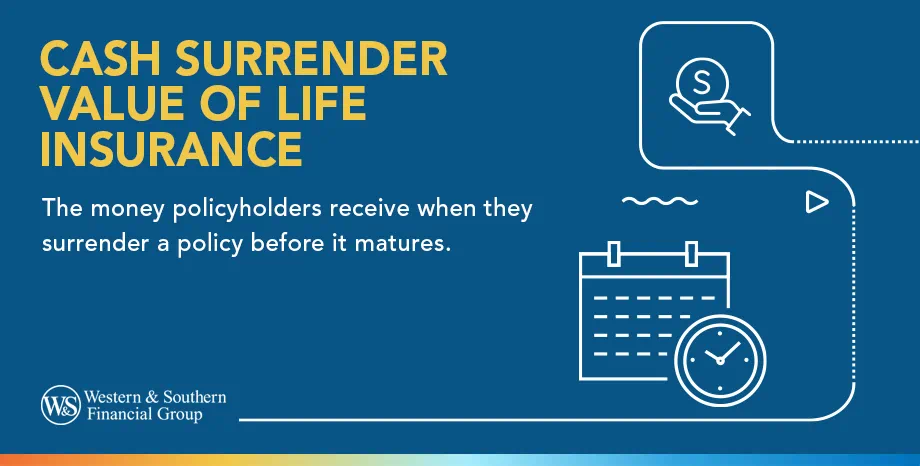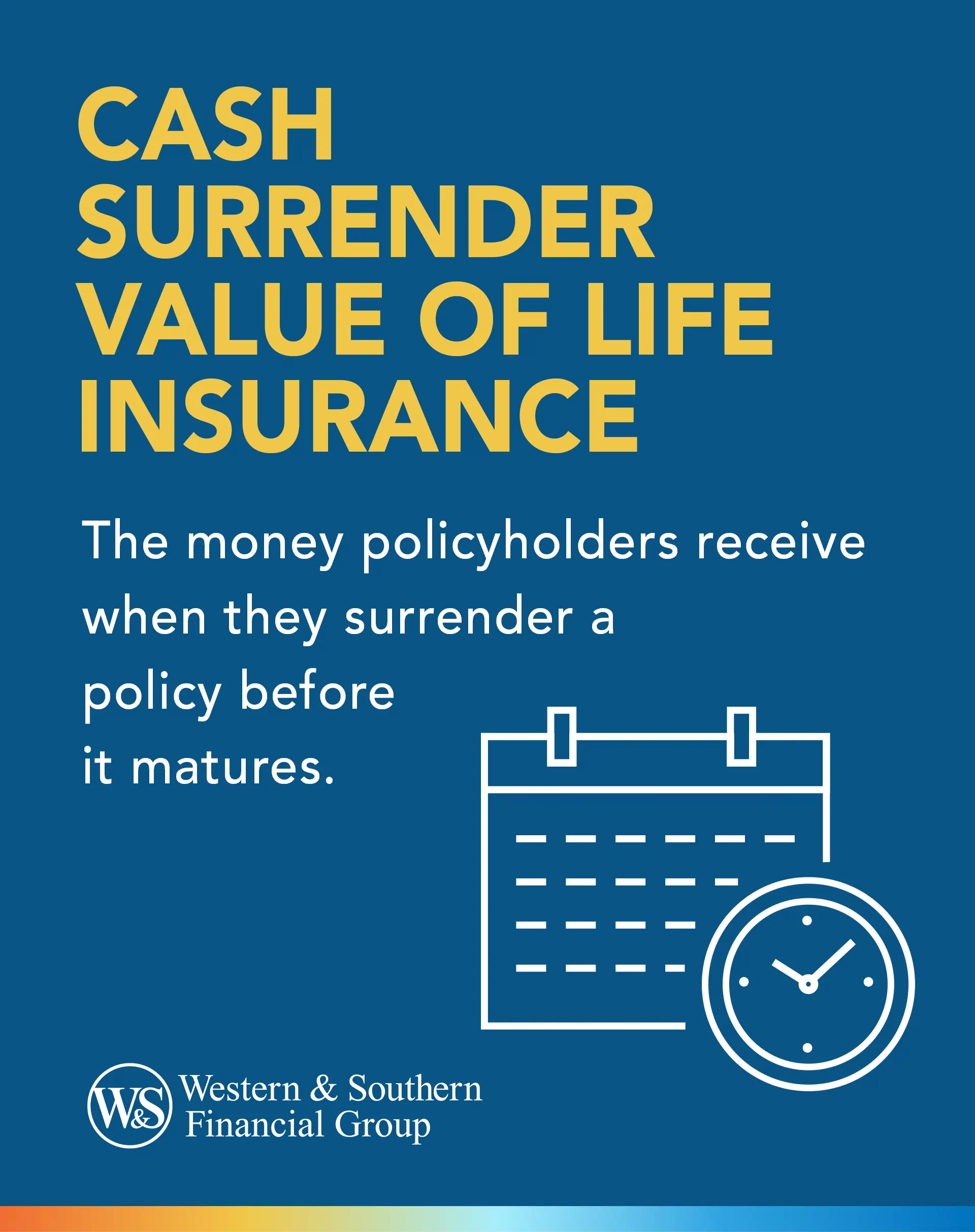

Key Takeaways
- The cash surrender value is the amount you’d receive if you cancel a permanent life insurance policy, minus fees and loans.
- Only permanent life insurance policies like whole and universal life build cash value over time, more term life policies do not.
- The amount is calculated by subtracting surrender charges and outstanding loans from your total accumulated cash value.
- Surrendering your policy can trigger taxes on gains, reduce or eliminate your death benefit, and end your coverage.
- Before surrendering, explore alternatives like policy loans, partial withdrawals, or reducing your coverage to avoid losing long-term protection.
Life insurance policies can help support long-term financial security - but what happens when you no longer need or want yours? You may have overlooked a financial feature of your policy: its cash surrender value.
This lesser-known feature can unlock real dollars, but it comes with considerations. Here's what you should know before cashing in.
What Is the Cash Surrender Value of Life Insurance?
The cash surrender value is the amount of money a policyholder receives if they cancel their life insurance policy. Unlike the face value or death benefit, it’s actually the cash you've built up, minus any fees for surrendering the policy and any loans with their interest that you might still owe.
Key Terms Defined
- Cash value: The part of your permanent life insurance that acts like a little savings reserve.
- Face value: The payout amount outlined in your policy.
- Surrender charges: The charges that the insurance company takes out when you decide to cancel your policy.
- Surrender period: The window of time when surrender charges kick in.
Types of Policies That Build Cash Value
Not all life insurance policies build cash value - only certain types of permanent coverage are designed to do so. Here's a summary of common life insurance types and their cash value potential:
- Whole life insurance builds up cash value as the years go by. It offers steady, stable premium payments, and lifelong coverage to help give you a sense of security.
- Universal life insurance also builds up cash value over time. It gives you more flexibility with how you pay your premiums and adjust your coverage. The cash value grows based on the interest rates set by your insurance company.
- Term Life Insurance generally does not accumulate cash value. It is created to offer cost-effective, short-term protection for a specific duration, without any savings feature.
Understanding what builds cash value before you decide to surrender will hopefully help you make a better informed decision to understand if you have cash value to surrender.
How Is Cash Surrender Value Calculated?
The insurance company starts with your total premium payments, then subtracts administrative fees, mortality costs, and surrender charges. Outstanding policy loans and loan interest also reduce the amount.
Here’s a simplified formula:
Cash Surrender Value = Cash Value – Surrender Charges – Outstanding Loans & Interest
The cash surrender value of a life insurance policy may grow over time, particularly after certain fees phase out. It’s a good idea to speak with a financial advisor to help determine the best course of action based on your situation.
Pros & Cons of Accessing the Cash Surrender Value
Before surrendering your policy, it’s important to weigh the potential benefits against the trade-offs, accessing your cash surrender value isn’t always a straightforward decision.
| Pros | Cons |
|---|---|
| Provides immediate access to cash | Reduces or eliminates death benefit |
| Can be used for emergencies or large expenses | May experience surrender charges |
| No repayment required (unlike a policy loan) | Cash value may be taxed as income |
| Ends ongoing premium payments | Loss of long-term life insurance coverage |
Alternatives to Surrendering a Life Insurance Policy
If surrendering your policy feels a bit too final for your liking, there are other ways to access its value or reduce costs without giving up your life insurance altogether.
Before canceling, consider these options:
- Policy Loan: You can tap into your policy's cash value by taking a loan against it and still keep the policy in play. However, taking out a loan may involve interest and potential fees. This should only be done in emergency situations and will reduce the death benefit.
- Withdraw Funds: You might be able to make partial withdrawals, especially if you have a universal life policy, but keep in mind that this might lower the death benefit.
- Reduce Paid-Up Insurance: Consider using your cash value to purchase a smaller policy, allowing you to enjoy coverage without any more premium payments.
- Life Settlement: Consider selling your policy to a life settlement company, which might offer you more than the surrender value. This option generally suited for older adults or individuals with certain health conditions.
- Convert to Term: Some permanent life policies give you the option to switch to a term policy for short-term coverage.
These choices might seem tempting, but chatting with a financial advisor can be really helpful in finding the best path for you and your loved ones.
Tax Implications of Cashing Out
If you decide to surrender your life insurance policy, it's good to know there might be some tax implications. Unlike policy loans or partial withdrawals, which may not be taxable if handled carefully, surrendering the policy is a full liquidation. This could also impact your eligibility for certain tax credits or benefits, depending on your income bracket after the payout is added.
Example:
- Total Premiums Paid: $20,000
- Cash Surrender Value: $30,000
- Taxable Income: $10,000
In this scenario, you'd report $10,000 in ordinary income on your tax return. That could mean a sizable increase in your annual tax bill, especially if you're already in a higher tax bracket or receive Social Security benefits that become taxable based on income thresholds. If the policy was originally a Modified Endowment Contract (MEC), different rules may apply, and withdrawals could be taxed on a LIFO (last-in, first-out) basis.
How Long Does It Take to Receive the Cash Surrender Value?
When you decide to go ahead with a surrender the time it takes to get your cash surrender value can differ a bit. This timeframe depends on their procedures and how quickly they receive all the necessary paperwork.
Here are typical steps to estimate when you'll receive your funds:
- Complete a surrender form provided by your life insurance provider
- Submit a replacement copy of the policy if you’ve lost the original
- Provide proof of identity as the certificate holder
- Ensure the policy is active and within the premium grace period
- Resolve any outstanding loan amount or accrued interest
Don’t forget that during the processing period, interest rates may continue to accrue on any unpaid policy loans, reducing your final payout.
Real-Life Example
Let’s look at a scenario that reflects how surrendering a policy might play out:
Diane, age 58, purchased a whole life insurance policy at 35. Over 23 years, she paid $45,000 in premium payments. The policy’s cash value has grown to $55,000 through guaranteed returns and dividends.
Diane decides she no longer needs the death benefit and would rather access the funds to help cover her daughter’s college expenses. The surrender fee listed in her policy is $500. She has no outstanding policy loans or interest.
Her final calculation:
- Cash Value: $55,000
- Minus Surrender Fee: $500
- Cash Surrender Value Received: $54,500
However, because her policy basis is $45,000, she’ll likely owe income tax on the $9,500 gain. Diane consults her financial professional to determine the best way to report the income and whether the surrender impacts her other financial goals.
This information is for learning purposes. It's a good idea to chat with a financial expert or advisor to ensure make the best choice before deciding to cash in your policy.
Tips for Policyholders
Whether you’re just reviewing your coverage or preparing to surrender your life insurance policy, a little preparation goes a long way:
- Request an updated policy statement to review your face value, cash value, and any loan amount
- Contact your life insurance provider to clarify the premium grace period, especially if you've missed recent payments
- Organize important paperwork, including your policy contract, previous premium payments, and any replacement copy of the original document
- Revisit your life insurance coverage needs whenever a major life change happens, like marriage, retirement, or receiving an inheritance
- Keep track of surrender deadlines and ask if any surrender charges are scheduled to drop off in the near future
For many people, giving up a life insurance policy isn't about abandoning life insurance altogether; it's about making smart moves. What suited your needs in the past may not align with your goals today. Understanding your available options is important in making informed decisions.
Final Thoughts
The cash surrender value of life insurance isn’t just a footnote in your policy; it can be a powerful financial tool when used wisely. Whether you're seeking liquidity, rebalancing your investments, or simplifying your finances, understanding this feature helps you make informed decisions.
That said, it’s not a one-size-fits-all move. The impact on your long-term coverage, taxes, and financial goals should all be carefully reviewed with a trusted advisor.
Prepare for your financial future with insights into life insurance's cash surrender value. Get a Life Insurance Quote
Frequently Asked Questions
Why is my cash surrender value so low?
What happens if a policy loan balance exceeds the cash surrender value?
What happens to the cash value after the policy is fully paid up?
How soon can I borrow from my life insurance policy?
Is cash surrender value an asset or liability?
Footnotes
- Cash value accumulates over time. Keep in mind cash value may take years to accumulate unless a large premium is paid up front.
- Loans will accrue interest. Loans and withdrawals may generate an income tax liability, reduce the Account Value and the Death Benefit, and may cause the policy to lapse. Sufficient premium and account value are necessary to cover insurance costs and charges. The policy may be issued as a Modified Endowment Contract (MEC) for tax purposes. Any withdrawals or surrenders could result in a taxable event.

















































